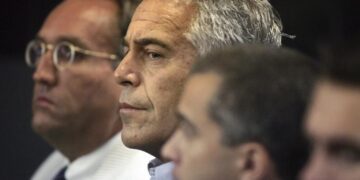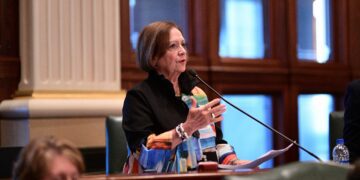By Nancy Thorner -
Time and again, humans have put into motion well-intentioned schemes to restore the environment to the condition people have come to believe is natural and pre-ordained by some higher authority, but they only made things worse. So:
- What if what we think we know about ecology and environmental policy is just wrong?
- What if environmental laws make things worse?
- What if the very idea of nature has been hijacked by politics?
- And what if “the wilderness” is something we create in our minds, as opposed to being an actual description of nature?
These are the questions Jim Lakely, Communications Director at The Heartland Institute, posed to those in attendance before introducing author Ryan M. Yonk as guest speaker at a Heartland event on Wednesday, May 11.
Yonk, along with Randy T. Simmons and Kenneth J. Sim, wrote Nature Unbound: Bureaucracy vs. the Environment, a book published by the Independent Institute, a non-profit, non-partisan, public-policy research and educational organization that shapes idea into profound and lasting impact. [How to purchase Nature Unbound.]
About the authors:
Ryan M. Yonk is a Research Fellow at the Independent Institute, Assistant Research Professor of Economics and Finance at Utah State University, and Executive Director of Strata Policy.
Randy T. Simmons is Senior Fellow at the Independent Institute and Co-founder, President, and Director of Research of Strata.
Kenneth J. Sim is Director of the Reliable Energy Education Network and a former Analyst with Strata Policy.
The book, Nature Unbound
In Nature Unbound, Yonk and his co-authors offer a devastating critique of federal environmental policy by scrutinizing it through the lenses of biological ecology and political ecology. The book makes us rethink environmental objectives. It aligns incentives with goals and affirms the notion that human beings are an integral part of the natural order and merit no less consideration than Earth’s other treasures. It isn’t enough to try to put an area into a time-capsule and preserve it for future generations. After all the natural world changes and even degrades. Nature is constantly in flux and will not maintain its beauty or current state without human intervention.
Nature Unbound likewise makes a good case for abandoning the balance of nature myth and rethinking the environmental laws aimed at maintaining the mythical balance. This thinking was present in passing the Clean Air Act, the National Environmental Policy Act, the Clean Water Act, the Endangered Species Act, the Wilderness Act, and, more recently, a slew of renewable energy legislation – even though laws often fail to meet their stated environmental goals and may lead instead to worse environmental and economic outcomes. For instance, did stopping logging operations in the Pacific Northwest return forests to their natural state? Ecosystems do not exist in a steady-state equilibrium where, if left alone, they return to an idealized conditions.
Guest Speaker and Author, Ryan Yonk
Yonk initially tackled two central problems about environmental thinking which are deeply flawed:
1. Balance of Nature: The outdated notion that nature actually has a steady equilibrium it rests at, that the environment would return to some Eden-like state if only humans wouldn't have touched it. But does a well-tended garden just happen on its own?
2. Assumed Perfect Political Process: The unfounded notion that the political process represents the best science and the popular will.
The Wilderness Act of 1964 and the Clean Air Act (Air Pollution Control Act of 1955) were passed to take back what was never meant to be. Even the American Indians changed the land to make it more hospitable. In actuality, things were getting better even before strict regulations were enacted – and not because of the new regulations. Rather, growing prosperity gave man more leisure time with which to engage the environment in positive ways.
Two early environmental crusaders cited by Yonk were John Muir and Aldo Leopold.
John Muir, a friend of President Teddy Roosevelt, founded the Sierra Club and helped guide an evolving wilderness movement that considered wilderness sacred space. Wanting to preserve the “cathedral of the mountains,” the Scottish environmentalist failed to draw support for his dream until he got involved in politics. He convinced Roosevelt of the beauty of his “wilderness as sacred space” vision, turning what had been a local discussion into a political one. In 1890, with the urging of Muir, Roosevelt created Yosemite National Park.
Aldo Leopold, called by some the father of wildlife conservation in America, helped organize the Wilderness Society. Early on, however, Leopold realized that restrictive laws had largely failed in their mission to conserve America’s forests, rivers, and other natural resources.
Conservation laws explode in late 60s and 70s
Following a decades-long lull in the passage of environmental laws, the late 60s and early 70s saw a surge we still feel today. Congress Greatly assisted through the infusion of government cash, the following laws and regulations were passed: the Federal Land Policy and Management Act, the Clean Air Act, the National Environmental Policy Act , the Clean Water Act, the Endangered Species Act, and created the Environmental Protection Agency. Although largely a failure in the ecological sense, they succeeded in the political realm.
Yonk presented this slogan of how restrictive environmental laws come into being: “Good Intentions, Bad Results.” Government is often motivated by disasters to do something, especially when the public demands action, but the results many times fail as an effective means to tackle the issue hand. For example: The 1969 Santa Barbara, CA oil spill, a relatively minor one as oil spills go, provided the impetus for the 1973 Clean Air Act (CAA), and the Clean Water Act (CWA) of 1972, which was grew out of the amended Federal Water Pollution control Act of 1948.
But what happens if nothing is done when a situation merits human intervention, such as the Bark and Beetle crisis Yonk cited? The outcome from failing to initially address the beetles was to create a fire risk because of damaged trees in the Logan, Oregon area. By 1989 the area had become a tinderbox – and with a no intervention policy, the Forest Service didn’t attempt to put out the fires; instead they put out people.
Biological and Political Principles in Managing the Environment
What about biological principles in regards to the environment? A slide presented by Yonk listed them as two-fold:
- Managing nature protects biological integrity better that does natural regulation.
- Natural, wilderness, preservation, and ecosystems are only human constructs, not scientific ones.
In regard to political principles interfering with good environmental policy, these three principles were noted:
- Powerful political forces are invested in existing legislation and regulation.
- Making political changes will require extensive and intensive political entrepreneurship.
- Marginal changes are more possible than wholesale changes, as nature is always in flux.
A short quote from Nature Unbound describes how this nation has dealt with environmental issues:
“This nation's conservation history might be compressed into two sentences: We tried to get conservation by buying land, by subsidizing desirable changes in land use, and by passing restrictive laws. The last method largely failed; the other two have produce some small samples of success.”
Concluding Thoughts
A number of questions were addressed to Yonk by those in attendance and by others watching the live-stream of the event on Heartland’s YouTube page.
One question was about the EPA and how people are selected to serve in the agency and how it fits in the structure of the executive branch. Yonk noted that EPA directly reports to the administration. President Obama is the agency’s boss, even though the EPA administrator is not a cabinet member. EPA has become completely radical in nature and is self-selecting in its members. They go from lobbying organizations into government and then into the regulating world to create policy. The same is also happening in other government agencies, where bureaucratic self-interests are easily realized and agents are constantly pushing for increases in budget and size.
Before introducing speaker and author, Ryan M. Yonk, Jim Lakely spoke with pride about Heartland’s new Michael Parry Mazur Memorial Library with its wealth of liberty and free market books. As Freedom and Liberty are under assault in this country, the support of both principles are important to to the survival of this nation. Read here my write-up about the grand opening on Wednesday, May 4th, 2016.
Lakely also solicited the donation of books for The Heartland Institute and suggested checking attics and basements. As Lakely said: “You can sure that they will be read and used.” To donate your books, call Heartland at 312/377-4000.







